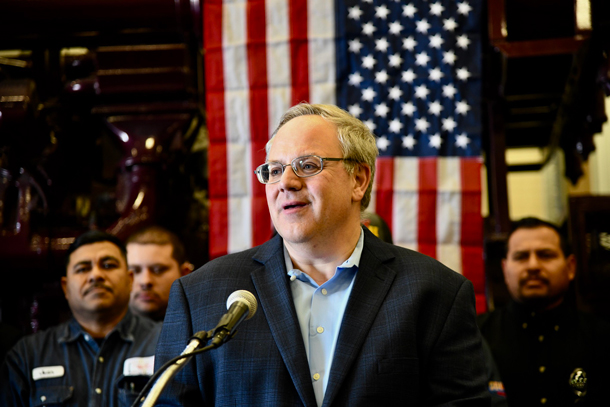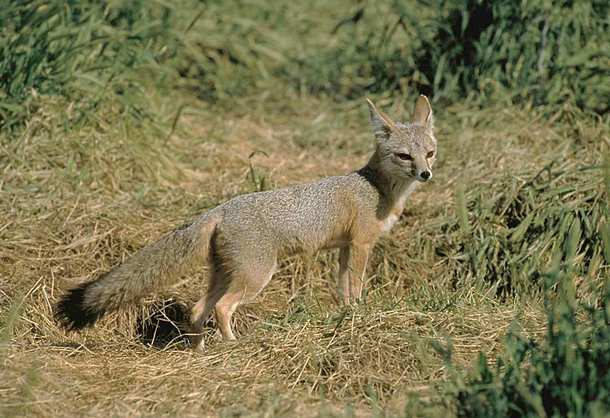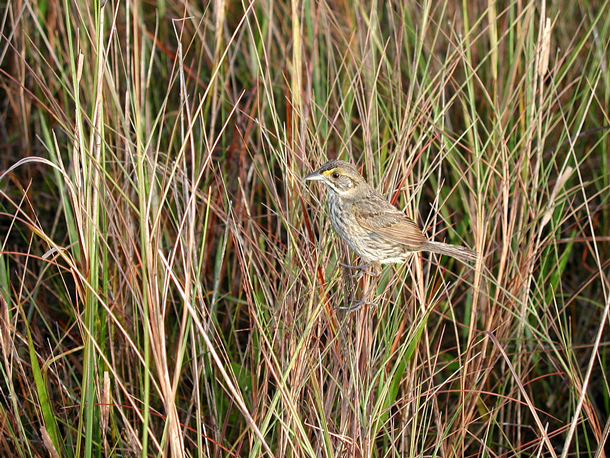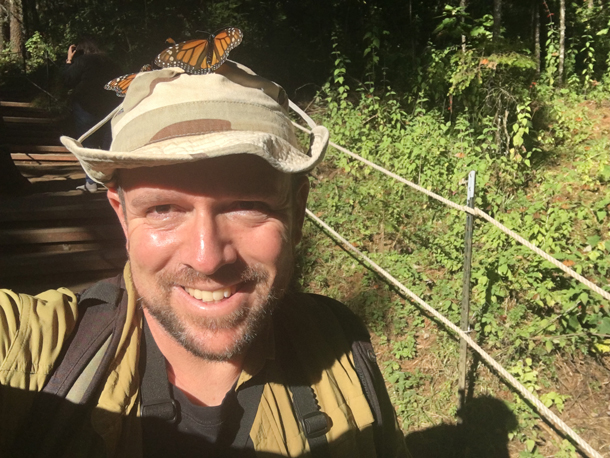Pesticide Risks Ignored at Trump Interior Dept.
Air Date: Week of April 12, 2019

Former oil and agribusiness lobbyist and former Deputy Secretary David Bernhardt was confirmed on April 11th by the Senate with a 56-41 vote as US Secretary of the Interior. (Photo: Flickr, US Department of the Interior CC BY-SA 2.0)
Former oil and agribusiness lobbyist David Bernhardt is the Trump Administration’s new Secretary of the Interior, and like his predecessor Ryan Zinke, he’s already dogged by allegations of ethical missteps from his time as Deputy Secretary that started in 2017. Recently over 84,000 pages of documents have surfaced alleging Secretary Bernhardt's interference with a U.S. Fish and Wildlife report on the risks certain pesticides may pose to endangered species. Brett Hartl, the Center of Biological Diversity’s Director of Government Affairs joined host Steve Curwood to talk about the dangers of the pesticides chlorpyrifos, malathion and diazinon for endangered species and other species alike.
Transcript
CURWOOD: When Secretary of the Interior Ryan Zinke stepped down in January amid multiple ethics probes his Deputy Secretary David Bernhardt, filled in. And now as the longtime oil and agribusiness lobbyist formally takes the reins at Interior criticism is mounting over alleged conflicts of interest. There are also complaints Mr. Bernhardt interfered with a key U.S. Fish and Wildlife Service report that detailed the risks pesticides can pose to endangered species. The Center for Biological Diversity and the New York Times obtained more than 84,000 documents about the pesticide report using the Freedom of Information Act. Brett Hartl is Director of Government Affairs for the Center and questions if the public interest will be the highest priority for Mr. Bernhardt.
HARTL: Well, his track record is very much on the side of industry and special interests. And he's worked over the last, you know, 20 years or more with a pretty single-minded purpose to weaken conservation laws, to weaken protections on the ground, on public lands and for wildlife. He has been working on these issues inside and outside of governments. He was the chief political lawyer -- so the, the number three position during the George W. Bush administration -- he knows all the ins and outs of how bureaucracies work and how the federal government makes decisions and where the pressure points are and how to make things happen. This administration, we've seen a lot of very unqualified nominees, people that do not understand the job they're doing. David Bernhardt knows what he's doing, and he knows what he wants. And I think that's actually why he's so dangerous.
CURWOOD: I gather much of your concern is based on some 84,000 or more pages of documents that the Center for Biological Diversity and news organizations obtained via the Freedom of Information Act. What do those documents show to you that is of paramount concern right now?
HARTL: Sure. So, to take a step back, for about four years now, the US Fish and Wildlife Service, which is the agency responsible for protecting, conserving and recovering endangered species, has been working on, or was working on, an assessment under the Endangered Species Act called a Biological Opinion. And this Biological Opinion reviewed the impacts of three pesticides: chlorpyrifos, which is fairly well known, it's an insecticide that is thought to cause neurological developmental problems in children; and two other pesticides: malathion and diazinon. These are all what are called organophosphate insecticides, which might not mean that much, but I'll just say that the organophosphate class of pesticides was first discovered in World War II, because they have the same chemical properties as nerve agents, they actually affect the nervous system in all animals of all types. So they're very highly toxic. They've been on the shelf for many, many years. But the harm has, you know, has been suspected to be quite significant to endangered species. And career staff at the Fish and Wildlife Service worked for four years on trying to understand where those harms were happening, and to which species on the ground. And all of that work basically stopped in 2017. And it's been derailed and slowed down, and we're told sort of publicly that these reviews may be finished by 2020, or 2021. And the Freedom of Information Act documents show that when David Bernhardt was briefed by the career staff at Fish and Wildlife about this assessment, that everything changed. And these assessments basically, for all real purposes, stopped. And the most damning piece of information is that he was told that nearly 1,400 endangered plants and animals -- the United States has about 1800, 1750 total endangered species nationwide -- 1400 were being jeopardized, which is a term in the Endangered Species Act. And it means that their existence is being put at risk. So they are potentially closer to extinction as a result of these pesticides.
CURWOOD: What species are at the top of the list of concern, as far as you know?

The San Joaquin Kit Fox is highly sensitive to habitat loss and pesticides (Photo: Wikimedia Commons CC)
HARTL: Well, so that's interesting, we don't actually know because many of these documents are still being hidden, and we're trying to get them brought to light. After the New York Times story broke, there was a letter from House Democrats requesting that these documents be released to the public. Senator Wyden from Oregon asked the Inspector General, sort of the watchdog of the Department of Interior, to look into this issue. We know from the PowerPoint, the presentation that David Bernhardt received from the career staff, that the scientists were actually very worried about most endangered plants, because the vast, vast majority of endangered plants are pollinated by insects. And they are very closely tied to specific species of insects in order to be pollinated. And if these very broad, sort of non-discriminatory pesticides are being used, they could simply wipe out all of the pollinators. And if you don't have pollination, then, you know, you don't reproduce future generations. So they're very worried about listed plants. We saw in the materials that they were worried about species like the San Joaquin kit fox, which is found in California. They said that the adverse effects to the fox directly as well as from the reduction in prey and sort of small mammals would harm the species. We know the Cape Sable seaside sparrow of southern Florida; I think they said potentially 6% a year were going to be lost because of pesticide exposure. And if you only have a few hundred individuals, losing 6% a year is significant. But we don't know, we're still trying to get more of these records. You know, the Trump administration is doing their best to keep them out of the public's view. So no one really knows how dangerous these pesticides really are.
CURWOOD: We've seen a collapse of insect populations in a number of places around the world. To what extent do you think that these pesticides that you're trying to get the information about are not only endangering endangered species, but the rest of us?

The Cape Sable Seaside Sparrow is another endangered species that is highly susceptible to pesticides. (Photo: Wikimedia Commons CC)
HARTL: Yeah, I mean, there are, unfortunately, many, many, many pesticides that have been approved for market by the EPA over the, over the years and decades. And we have argued for a very long time that if you don't think about the impacts to endangered species, and protect sort of the most endangered things out there, what does that say about everything else? Very few pesticides have any, I would say meaningful site-based restrictions on their use. You can use most pesticides anywhere in the nation, to address any crop. Many of them are used for, you know, non-crop activities as well. So, you know, tree farms or mosquito control or whatever. But we don't really think about the large-scale impacts to sort of functioning, healthy ecosystems if you're being doused by insecticide, and then fungicides and herbicides. You know, all pesticides are basically poisons, and how they affect non-target organisms is just not considered. Unfortunately, like many of these issues, it's hard to draw the straight line of cause and effect because we live in a very complicated world, and there's many threats to species and to wildlife. But it's clear that, you know, the overuse of pesticides without real restrictions, is having big impacts out in the landscape.
CURWOOD: From your perspective, what's the motivation of David Bernhardt and the top level of the Department of Interior to block disclosure about how dangerous these pesticides may be to wildlife?
HARTL: Well, we know that a lot of the pesticide companies are, and have been, large donors to the Trump administration. So as an example, Dow Chemical, which is the maker of chlorpyrifos, gave $1 million to Donald Trump's inauguration, so back in 2017. And one of their first asks was that they wrote a letter to then-Secretary Ryan Zinke at the Interior Department, as well as Scott Pruitt at the EPA, and asked them to stop these reviews, because from industry's perspective, chlorpyrifos -- again, this is a pesticide that causes neurological developments in children -- was close to being banned by the Obama administration. Unfortunately, they ran out of time, and Scott Pruitt reversed them. But this is a pesticide that we are still using millions of pounds every year. And that's obviously a huge business profit if you're, we're using that much of this pesticide on the ground. So there's a huge financial incentive. Why does David Bernhardt want this? Well, I mean, his pattern has been since, for many, many years that he, he takes industry's side. He has worked for industry, he works for the oil and gas industry, the mining industry, agriculture, he believes sort of their perspective and he wants to help them achieve their objectives. So you know, the motivation -- sort of that classic "drain the swamp" situation that Donald Trump railed against during his campaign, but in reality, he has enabled probably more than any other modern recent president.

Brett Hartl is the Government Affairs Director with the Center for Biological Diversity. (Photo: Courtesy of Brett Hartl)
CURWOOD: Brett Harlt is Director of Government Affairs for the Center for Biological Diversity. Brett, thanks so much for taking the time with us today.
HARTL: Thanks a lot. Have a great day.
CURWOOD: Mr. Bernhardt declined to respond to repeated requests from Living on Earth to appear on this program.
Links
The New York Times | “Interior Nominee Intervened to Block Report on Endangered Species”
Documents blocked by David Bernhardt and obtained via Freedom of Information Act
Read the Endangered Species Act
Living on Earth wants to hear from you!
Living on Earth
62 Calef Highway, Suite 212
Lee, NH 03861
Telephone: 617-287-4121
E-mail: comments@loe.org
Newsletter [Click here]
Donate to Living on Earth!
Living on Earth is an independent media program and relies entirely on contributions from listeners and institutions supporting public service. Please donate now to preserve an independent environmental voice.
NewsletterLiving on Earth offers a weekly delivery of the show's rundown to your mailbox. Sign up for our newsletter today!
 Sailors For The Sea: Be the change you want to sea.
Sailors For The Sea: Be the change you want to sea.
 The Grantham Foundation for the Protection of the Environment: Committed to protecting and improving the health of the global environment.
The Grantham Foundation for the Protection of the Environment: Committed to protecting and improving the health of the global environment.
 Contribute to Living on Earth and receive, as our gift to you, an archival print of one of Mark Seth Lender's extraordinary wildlife photographs. Follow the link to see Mark's current collection of photographs.
Contribute to Living on Earth and receive, as our gift to you, an archival print of one of Mark Seth Lender's extraordinary wildlife photographs. Follow the link to see Mark's current collection of photographs.
 Buy a signed copy of Mark Seth Lender's book Smeagull the Seagull & support Living on Earth
Buy a signed copy of Mark Seth Lender's book Smeagull the Seagull & support Living on Earth

